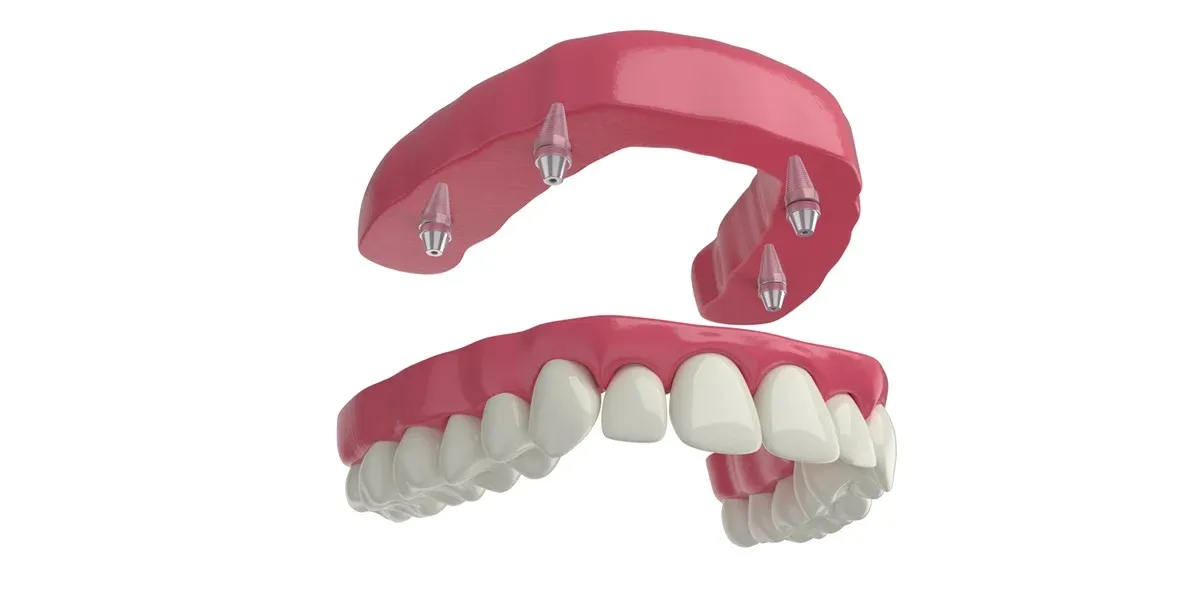Recovery and Aftercare Tips for All-on-4 Dental Implants
by Dr. Labeeb
19 February 2025

All-on-4 dental implants provide a full-arch tooth replacement with just four implants in the upper or lower jaw. Unlike traditional implants that may require bone grafting and months of waiting, this procedure allows for same-day placement of temporary teeth. While the surgery itself is efficient, the recovery process is crucial for long-term success. Proper aftercare helps the implants heal properly, reduces the risk of complications, and ensures that the new teeth remain stable and functional for years.
We will cover everything from managing pain and swelling to maintaining oral hygiene and making necessary lifestyle adjustments. Following these guidelines can help patients experience a smooth recovery and enjoy lasting benefits from their All-on-4 implants.

What to Expect After Surgery
The recovery timeline for All-on-4 dental implants varies by individual, but most patients go through similar stages of healing. The first few days after surgery are the most critical, as the body begins adjusting to the implants. Patients should expect swelling, mild bleeding, and some discomfort, but these symptoms should gradually improve over the first two weeks.
First 24 to 48 Hours
In the first 24 hours, patients may notice some fluids oozing around the implant sites. This is normal and can be controlled by gently biting down on gauze. Keeping the head elevated while sleeping can help minimize swelling. Ice packs applied to the cheeks in 15-minute intervals can further reduce inflammation.
Week 1 to Week 2
Swelling and bruising may peak around the second or third day and then gradually subside. Pain medication prescribed by the dentist should be taken as directed, and patients should follow a soft-food diet to avoid putting pressure on the implants. Most people can resume light activities after a few days but should avoid strenuous exercise.
Weeks 3 to 6
By this stage, most discomfort has resolved, and patients can begin eating slightly firmer foods. The implants continue integrating with the jawbone, a process called osseointegration. During this time, it’s important to maintain good oral hygiene and avoid habits that could put stress on the implants, such as biting on hard and crunchy foods.
After Three Months
At this point, the implants should be fully integrated, and the temporary prosthetic teeth will be replaced with the final, custom-designed set. Patients can begin eating a more varied diet with some hard and crunchy foods as well. They can return to their normal routines with proper implant care.

Managing Pain and Swelling
Pain and swelling are expected after any surgical procedure, but they can be controlled with simple strategies. The key is to manage discomfort early before it becomes difficult to control.
Pain Management
The level of pain varies from person to person, but most patients find that it is manageable with prescribed medications. Dentists typically recommend a combination of anti-inflammatory drugs, such as ibuprofen, and stronger prescription painkillers if necessary. It is important to take medications as directed and not wait until pain becomes severe before using them.
Swelling and Bruising
Swelling peaks within the first 48 hours after surgery. Applying ice packs to the face during the first day can help reduce inflammation. From the third day onward, switching to warm compresses can improve blood circulation and help bruising fade faster. Sleeping with the head elevated for the first few nights can prevent excessive swelling.
When to Contact the Dentist
If pain or swelling worsens instead of improving after a few days, it may indicate an infection or another complication. A fever, excessive bleeding, or unusual discharge from the implant sites also requires immediate attention.
Eating and Drinking After All-on-4 Surgery
A soft-food diet is necessary after All-on-4 surgery to prevent unnecessary pressure on the implants. Eating the wrong foods too soon can interfere with healing and cause complications.
First Few Days
Immediately after surgery, patients should stick to liquids and very soft foods. Smoothies, yogurt, applesauce, and lukewarm soups are good choices for the first few days after surgery. Avoid anything too hot, cold, spicy, or acidic, as these can irritate the healing gums.
Weeks 1 to 2
After the first few days, patients can start introducing soft, chewable foods such as scrambled eggs, mashed potatoes, pasta, and soft fruits. Cutting food into small pieces and chewing slowly can help prevent strain on the implants.
Weeks 3 to 6
As healing progresses, slightly firmer foods such as well-cooked vegetables, ground meats, and soft bread can be added to the diet. However, it’s important to continue avoiding crunchy, sticky, or very tough foods until given approval by the dentist.
Long-Term Diet Adjustments
Once fully healed, patients can eat a wider variety of foods but should still avoid biting directly into hard foods with the front teeth. Chewing on ice, hard candies, or non-food objects can damage the prosthetic teeth or stress the implants. Staying hydrated and eating a balanced diet helps maintain oral and overall health.
Oral Hygiene and Cleaning Tips
Keeping the mouth clean is critical for preventing infections and ensuring the long-term success of All-on-4 implants. Since the gums will be healing, special care is required to clean around the implants without causing irritation.
First Week of Healing
During the first few days, patients should avoid direct brushing on the surgical areas. Instead, rinsing with warm salt water several times a day can help keep the mouth clean. Antibacterial mouthwash may also be recommended.
Brushing and Flossing After Surgery
After about a week, gentle brushing with a soft-bristled toothbrush can begin. It’s important to avoid scrubbing too hard or using toothpaste with abrasive ingredients. Regular flossing should be replaced with water flossers or interdental brushes to clean around the implants without irritating the gums.
Long-Term Hygiene Routine
Even though All-on-4 implants are not natural teeth, they require regular cleaning to prevent gum disease and implant failure. Daily brushing, using non-alcohol mouthwash, and professional dental cleanings every six months help maintain implant health.
Activity Restrictions and Lifestyle Adjustments
Recovery from All-on-4 surgery is not just about oral care; it also requires temporary lifestyle adjustments to avoid complications.
Physical Activity
Strenuous exercise should be avoided for at least a week after surgery. Activities that increase blood pressure, such as heavy lifting, can cause bleeding and swelling. Light walking is fine and can help with circulation, but patients should gradually ease back into workouts.
Smoking and Alcohol Use
Smoking is one of the biggest risk factors for implant failure. It reduces blood flow to the gums and slows down healing. Patients are strongly advised to quit smoking before and after the procedure. Alcohol should also be avoided during the first week, as it can interfere with the healing process.
Long-Term Care for Implants
Protecting the implants from excessive force is important. If a patient grinds their teeth at night, a dentist may recommend a nightguard to prevent damage. Regular dental visits ensure that any minor issues are caught early before they become major problems.
Conclusion
Recovering from All-on-4 dental implant surgery requires patience and proper aftercare. The first few weeks are crucial for healing, and following post-surgical instructions can make a significant difference in how well the implants integrate with the jawbone. Eating soft foods, maintaining oral hygiene, and avoiding strenuous activities help create a smooth recovery process.
Long-term care is just as important as the initial healing period. Good oral hygiene habits, regular dental check-ups, and avoiding harmful behaviors like smoking can extend the life of the implants. With proper care, All-on-4 dental implants can provide a strong, functional, and confident smile for many years.
For any questions or concerns during recovery, contacting the dental provider early can prevent complications and keep the healing process on track.
Share This:
Disclaimer
*This media/content or any other on this website does not prescribe, recommend, or prevent any treatment or procedure. Therefore, we highly recommend that you get the advice of a qualified dentist or other medical practitioners regarding your specific dental condition. *

